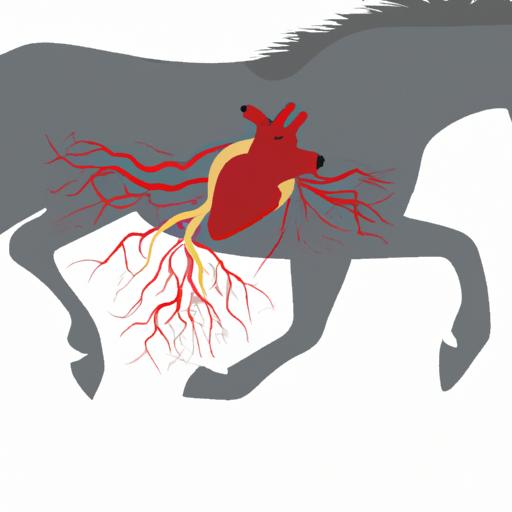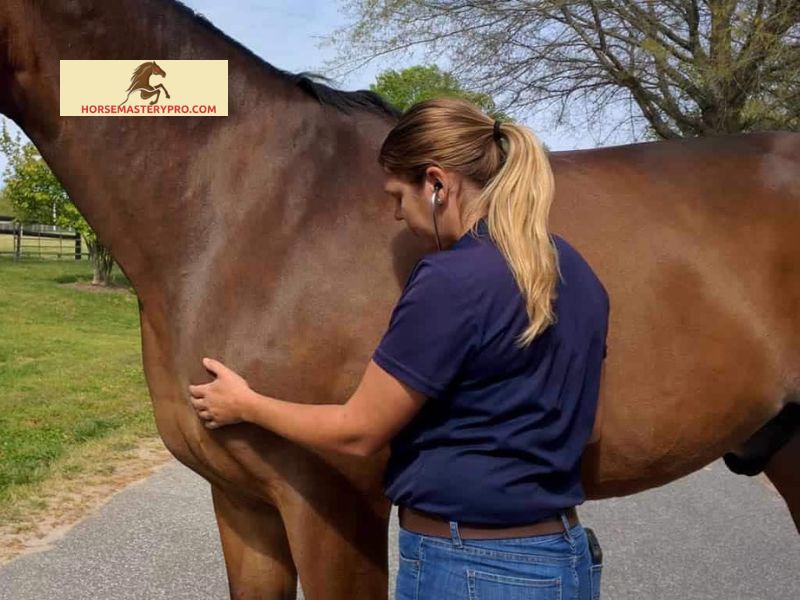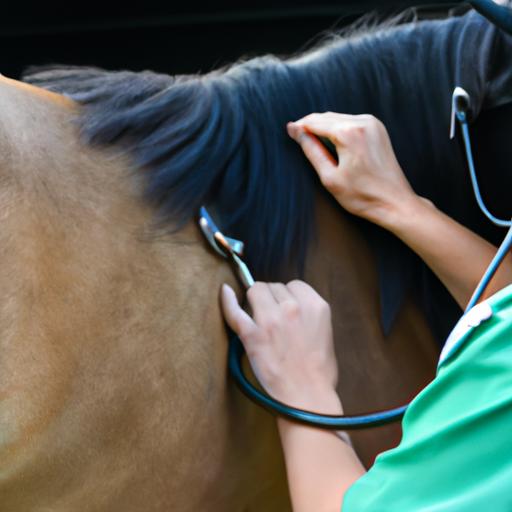Discover effective treatments and management strategies for heart murmurs in horses. Learn about medical interventions, lifestyle adjustments, and ongoing care.
Have you ever wondered what a heart murmur in horses actually means? Well, let’s dive into the fascinating world of equine health and explore the ins and outs of this condition. In this article, I will provide you with a comprehensive understanding of heart murmurs in horses, the importance of their diagnosis, and a sneak peek into what you can expect to learn throughout this informative piece.
Definition and Explanation of a Heart Murmur in Horses
So, what exactly is a heart murmur? Just like in humans, a heart murmur in horses refers to an abnormal sound that can be heard during a veterinary examination. It is caused by turbulent blood flow within the heart or blood vessels. This audible anomaly can be an indication of an underlying cardiac issue or structural abnormality within the horse’s cardiovascular system.
Importance of Understanding and Diagnosing Heart Murmurs in Horses
Understanding and diagnosing heart murmurs in horses is of utmost importance for several reasons. Firstly, it allows veterinarians to identify potential underlying cardiovascular conditions that may require immediate attention or ongoing management. Timely diagnosis can significantly impact the horse’s overall health and performance.
Moreover, early detection of heart murmurs enables veterinarians to develop appropriate treatment plans tailored to the specific needs of each horse. By accurately assessing the severity and cause of the murmur, veterinarians can implement targeted interventions to improve the horse’s well-being and minimize potential complications.
Brief Overview of the Article’s Content
Throughout this article, we will explore the causes of heart murmurs in horses, the common symptoms and signs to look out for, the potential effects and risks associated with these murmurs, and the various treatment and management options available. We will also delve into prevention strategies and discuss the long-term prognosis for horses diagnosed with heart murmurs.
So, get ready to embark on a journey into the world of equine cardiology, as we unravel the mysteries surrounding heart murmurs in horses. By the end of this article, you will have a deeper understanding of this condition and be equipped with the knowledge to ensure the well-being of your equine companion.
Stay tuned for the next section, where we will explore the underlying causes of heart murmurs in horses. Remember, knowledge is power, and together, we can navigate the world of equine health with confidence.
Stay tuned for Causes of Heart Murmurs in Horses!
Causes of Heart Murmurs in Horses

A horse’s heart murmur can stem from various underlying conditions, each with its own unique set of causes. Let’s take a closer look at some of the common factors that can lead to heart murmurs in horses and explore the role of genetic factors, congenital heart defects, as well as potential causes related to age, exercise, or stress.
Common Underlying Conditions that can Lead to Heart Murmurs in Horses
Heart murmurs in horses can arise from a range of underlying conditions. One common cause is valvular insufficiency, where the heart valves fail to close tightly, resulting in blood leakage and turbulence. This can be caused by age-related degeneration or bacterial endocarditis, an infection of the heart valves.
Another prevalent condition associated with heart murmurs is hypertrophic cardiomyopathy, characterized by the thickening of the heart muscle. This thickening can disrupt the normal blood flow, leading to the production of a murmur.
Genetic Factors and Congenital Heart Defects
Genetic factors can play a role in the development of heart murmurs in horses. Some breeds may have a predisposition to certain heart conditions, such as mitral valve dysplasia or ventricular septal defects. These congenital heart defects are present at birth and can contribute to the occurrence of heart murmurs.
Potential Causes Related to Age, Exercise, or Stress
Age, exercise, and stress can also impact the occurrence of heart murmurs in horses. As horses age, their cardiovascular system may undergo changes, increasing the likelihood of developing murmurs. Intense exercise or strenuous training can place additional strain on the heart, potentially leading to murmurs. Additionally, high-stress situations, such as transport or competition, can temporarily affect heart function and produce murmurs.
By understanding the various causes of heart murmurs in horses, we can better comprehend the complexities of this condition. In the next section, we will explore the symptoms and signs that may indicate the presence of a heart murmur, allowing for timely diagnosis and intervention.
Stay tuned for Symptoms and Signs of Heart Murmurs in Horses!
Symptoms and Signs of Heart Murmurs in Horses

Physical signs that may indicate the presence of a heart murmur
When it comes to identifying a heart murmur in horses, there are several physical signs that could raise a red flag. One common indicator is an abnormal rhythm heard during auscultation with a stethoscope. This irregular sound may range from a soft swishing noise to a more pronounced whooshing sound. Additionally, an increased heart rate or abnormal heart sounds may accompany the murmur.
Behavioral changes or performance issues that could be associated with heart murmurs
Horses with heart murmurs may exhibit certain behavioral changes or performance issues that warrant attention. Keep a watchful eye for signs such as decreased exercise tolerance, fatigue, or a reluctance to engage in physical activity. These performance issues could indicate that the cardiovascular system is being compromised by the murmur, affecting the horse’s overall stamina and endurance.
How veterinarians diagnose heart murmurs in horses
Diagnosing a heart murmur in horses requires the expertise of a skilled veterinarian. During a thorough examination, the veterinarian will listen to the horse’s heart using a stethoscope, paying close attention to any abnormal sounds. To further evaluate the murmur, additional diagnostic tools such as echocardiography or electrocardiography may be utilized. These tests provide detailed images and measurements of the heart’s structure and function, aiding in the accurate diagnosis and assessment of the murmur’s severity.
Remember, only a qualified veterinarian can properly diagnose a heart murmur in your horse. If you suspect your horse may have a heart murmur or if you notice any concerning symptoms, it is crucial to seek professional veterinary care promptly. Early detection and diagnosis can lead to more effective treatment strategies and better outcomes for your equine companion.
Stay tuned for Effects and Risks of Heart Murmurs in Horses!
Effects and Risks of Heart Murmurs in Horses

Impact of Heart Murmurs on a Horse’s Overall Health and Performance
When it comes to heart murmurs in horses, it is essential to understand the potential effects they can have on the overall health and performance of these magnificent creatures. While some heart murmurs may be harmless and have minimal impact, others can significantly affect a horse’s well-being.
Heart murmurs can disrupt the normal flow of blood within the cardiovascular system, leading to decreased efficiency in delivering oxygen and nutrients to vital organs and muscles. This reduced blood flow can result in fatigue, decreased exercise tolerance, and poor performance. Horses with severe murmurs may experience exercise intolerance, shortness of breath, and even fainting episodes.
Potential Complications and Risks Associated with Untreated Heart Murmurs
Untreated heart murmurs in horses can pose several risks and complications. One significant concern is the potential progression of the underlying cardiovascular condition. If left untreated, certain heart conditions can worsen over time, leading to more severe symptoms and potentially life-threatening consequences.
Heart murmurs can also increase the risk of developing other health issues. The turbulent blood flow associated with murmurs can create an environment conducive to the formation of blood clots, which may travel to other parts of the body and cause blockages. Additionally, untreated murmurs can put additional strain on the heart, leading to the development of heart failure.
Importance of Regular Monitoring and Veterinary Care for Horses with Heart Murmurs
Regular monitoring and veterinary care are crucial for horses diagnosed with heart murmurs. By closely monitoring the condition, veterinarians can assess the progression of the murmur and any associated cardiac abnormalities. This allows for timely adjustments to the treatment plan and interventions to manage any developing complications.
Veterinarians may recommend routine check-ups to evaluate the horse’s overall health, assess heart function, and detect any changes in the murmur’s characteristics. These check-ups often involve diagnostic tests such as echocardiograms, electrocardiograms, and auscultation to provide a comprehensive understanding of the horse’s cardiac health.
Remember, early intervention and ongoing veterinary care can greatly improve the prognosis for horses with heart murmurs. So, make sure to prioritize regular monitoring and seek professional guidance to ensure the well-being and longevity of your equine companion.
Stay tuned for Treatment and Management of Heart Murmurs in Horses!
Conclusion
In conclusion, understanding and diagnosing heart murmurs in horses is crucial for ensuring their overall health and well-being. By familiarizing ourselves with the causes, symptoms, and potential risks associated with heart murmurs, we can take proactive measures to provide the best possible care for our equine companions.
Throughout this article, we have explored the definition and explanation of heart murmurs in horses, highlighting their significance within the equine cardiovascular system. We have discussed the importance of early detection and diagnosis, enabling veterinarians to develop tailored treatment plans specific to each horse.
From medical interventions and therapies to lifestyle and management adjustments, there are various strategies available to address heart murmurs in horses. Veterinary care, including follow-up examinations, plays a vital role in monitoring the progress of the condition and adjusting treatment plans accordingly.
Remember, prevention is key. By implementing measures to promote optimal equine health, such as regular exercise, proper nutrition, and stress reduction, we can reduce the likelihood of heart murmurs and other cardiovascular issues in our horses.
At horsemasterypro.com, we strive to provide you with valuable insights into equine health and care. We hope this article has empowered you with the knowledge to navigate the world of heart murmurs in horses effectively.
So, whether you’re a seasoned equestrian or a horse lover looking to expand your knowledge, we encourage you to stay informed and proactive in safeguarding the well-being of your equine companions.
Thank you for joining us on this journey of understanding heart murmurs in horses. For more informative content and expert advice, be sure to visit horsemasterypro.com.
Remember, your horse’s heart deserves the utmost care and attention!


